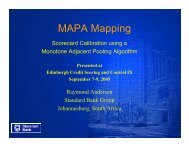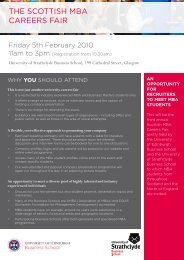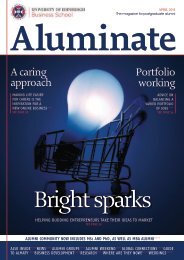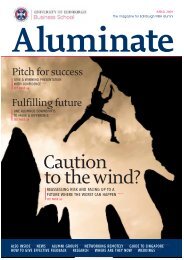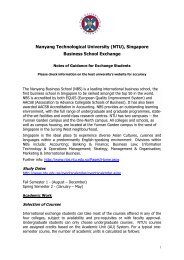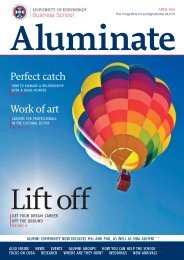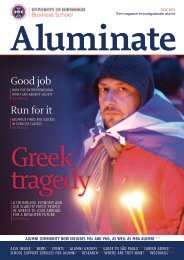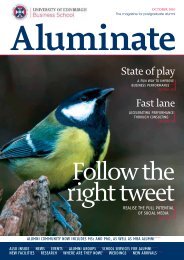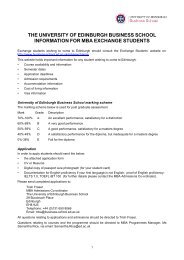killed Saab Automobile? - Business School - University of Edinburgh
killed Saab Automobile? - Business School - University of Edinburgh
killed Saab Automobile? - Business School - University of Edinburgh
Create successful ePaper yourself
Turn your PDF publications into a flip-book with our unique Google optimized e-Paper software.
increasing number <strong>of</strong> suppliers had stopped deliveries to <strong>Saab</strong>. On 7 April production stopped, with no<br />
date given for a re-start.<br />
<strong>Saab</strong> was now facing chronic liquidity problems and embarked on an increasingly desperate set <strong>of</strong><br />
measures to raise cash. Vladimir Antonov, the purchaser <strong>of</strong> the Spyker Sports car business (who in<br />
2009 had been refused permission to invest in <strong>Saab</strong> amidst unsubstantiated rumours on involvement in<br />
money laundering and organized crime lv ) re-iterated his desire to take up to a 30% stake in the<br />
company. <strong>Saab</strong> also entered into discussions to sell its Trollhättan properties, which since have been<br />
partly sold and leased back.<br />
DESPERATION: THE SEARCH FOR PARTNERS<br />
The situation was becoming increasingly desperate and was showing signs <strong>of</strong> spiralling out <strong>of</strong> control.<br />
Anders Borg, the Swedish Finance Minister, went on Swedish TV arguing that more clarity was needed<br />
about <strong>Saab</strong>’s control structures. Lars Holmqvist, the CEO <strong>of</strong> the European Association <strong>of</strong> Automotive<br />
Suppliers commented:<br />
'With a very unclear ownership structure and no financial muscle, it seems [<strong>Saab</strong>] are into a very<br />
negative spiral. The reason they are stopping is they have not paid their bills and will not get<br />
components. They are not selling cars and are making very big losses…<br />
'…'If it is right what is being reported, it means Antonov would go in immediately with SEK270m<br />
(US$43.2m) - that is not [enough] even to cover the debt owing to the suppliers… It would not<br />
even help starting. It could release some components, but that is <strong>of</strong> course not [the] major<br />
problem.' lvi<br />
The ‘unclear control structure’ with which <strong>Saab</strong> now found itself was causing problems. The EIB, the<br />
Swedish state (as guarantor <strong>of</strong> the loan) and GM all had a stake in any outcome, and their approval<br />
was necessary for the sale <strong>of</strong> facilities and fresh investment by Antonov. Late April brought approval <strong>of</strong><br />
Antonov as an investor from the Swedish national Debt <strong>of</strong>fice, but the position <strong>of</strong> the other stakeholders<br />
was not clear.<br />
On 3 May there was another twist – <strong>Saab</strong> announced it had signed a US$223 million deal with China’s<br />
Hawtai to produce and sell <strong>Saab</strong> cars in China. This too would require approval from <strong>Saab</strong>’s multiple<br />
stakeholders and by the end <strong>of</strong> the first week <strong>of</strong> May fingers were being pointed at the EIB for holding<br />
up approval <strong>of</strong> Antonov and Hawtai as investors. It was to be only days before the goal posts moved<br />
again on 12 May as Hawtai apparently failed to get the necessary regulatory approvals in China.<br />
Muller was out in China, seeking another partner and within four days came an announcement – a<br />
memorandum <strong>of</strong> understanding (MoU) had been signed with Pang Da <strong>Automobile</strong> Trade company,<br />
China’s largest public auto distributor, with 1,100 dealerships worldwide. Under the agreement Pang Da<br />
was to make a €30 million payment for (yet-to-be-produced) <strong>Saab</strong> cars with another €15 million for<br />
more within 30 days lvii . The agreement also made provision for a joint venture operation to manufacture<br />
<strong>Saab</strong>s in China, with a manufacturing partner to be identified appointed. The purchase <strong>of</strong> the cars<br />
themselves does not require government approval, but a joint venture for a manufacturing operation<br />
does, something that can be problematic as the Chinese government is working to rationalize its auto<br />
industry in order to avoid fragmentation and ensure a limited number <strong>of</strong> high-volume, globally<br />
competitive car companies.<br />
The news <strong>of</strong> the Pang Da deal and the modest liquidity it injected into <strong>Saab</strong> was sufficient to briefly<br />
restart vehicle production at <strong>Saab</strong> on 27 May. But by 8 June the line stopped again, due to supply<br />
16



